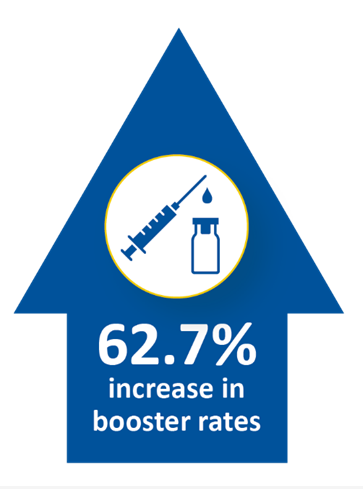In January 2022, a nursing home that had not had any COVID-19 cases for more than a year was referred to Health Quality Innovators (HQI) for assistance with improving its resident COVID-19 booster rate and responding to a sudden COVID-19 outbreak. The nursing home demonstrated a 62.7 percent increase in booster rates from when the facility was first referred to HQI and the last report to the National Healthcare Safety Network (NHSN) database in May 2022.
had not had any COVID-19 cases for more than a year was referred to Health Quality Innovators (HQI) for assistance with improving its resident COVID-19 booster rate and responding to a sudden COVID-19 outbreak. The nursing home demonstrated a 62.7 percent increase in booster rates from when the facility was first referred to HQI and the last report to the National Healthcare Safety Network (NHSN) database in May 2022.
During initial conversations with the nursing home leadership team, HQI, a Centers for Medicare & Medicaid Services Quality Innovation Network-Quality Improvement Organization (QIN-QIO), identified two challenges: 1) The facility was struggling to address the COVID-19 outbreak as a result of not having any cases in more than a year; and 2) As a result of the outbreak, limited administrative staff was available to educate residents and receive consents for a booster vaccine. As a result of these staffing constraints, the Administrator and Director of Nursing prioritized outbreak response.
Prioritizing the Outbreak Response
As a first step in the outbreak response, HQI worked with the nursing home to perform a root cause analysis. During this process, the facility identified that the lack of staff masking, due to mask fatigue, likely contributed to spreading the virus. In response, HQI helped the nursing home Administrator and Director of Nursing develop a quality improvement initiative using the HQI Masking Action Plan template. Interventions the facility chose to implement included masking-specific infection prevention strategies and refreshed signage about the importance of masking to prevent mask fatigue. Within three to four weeks, COVID case numbers began to decline from six (when the facility was referred to HQI) to zero, following implementation of the interventions the nursing home selected.
Preparing for COVID-19 Resident Booster Administration
While the nursing home was still managing the outbreak, HQI worked with the facility’s leadership team to improve their resident COVID-19 booster rate. As a first step, a root cause analysis was conducted, and an action plan was developed using the HQI COVID-19 Resident Booster Action Plan template. The tool follows the Plan-Do-Study-Act cycle and includes templates the nursing home completed, with the help of an HQI Quality Improvement Advisor (QIA), to identify opportunities for improvement, choose goals, and to select specific actions to implement.
HQI also recommended the nursing home assemble a strike team as an intervention to increase resident COVID-19 boosters. The purpose of the strike team was to educate residents about the booster vaccine and quickly collect signed consent forms in a matter of hours, or in a single day. This approach allowed the nursing home to schedule a vaccination/booster clinic following the reduction in COVID case numbers and quickly administer booster vaccines to all residents who had signed a consent form.
To help the facility reach the goals outlined in its plan, the HQI QIA recommended four specific resources. These included: COVID-19 Booster information from the Centers for Disease Control and Prevention (CDC), These Days Everyone Deserves a BOOST poster from The Society for Post-Acute and Long-Term Care Medicine, Talking with Patients about COVID-19 Vaccination using Motivational Interviewing from the CDC and the Do I Need a Booster Shot? poster from the American Health Care Association/National Center for Assisted Living.
Maintaining Progress
HQI conducts monthly check-ins with the nursing home to learn about challenges the facility may be facing and provides assistance, if needed. HQI also offers opportunities for COVID-19 and vaccine/booster education. The recently launched Simple Strategies Stand Up on the second Tuesday of each month, focuses on strategies for improving vaccination/booster rates. The Prepare, Prevent, Protect Infection Prevention Series on the third Tuesday of the month, also recently launched, targets newer nursing home infection preventionists and staff. The Weekly Dose, a short weekly e-newsletter, highlights relevant tools and resources and upcoming educational events. In May, the publication had an average open rate of 16 percent and an average click-through rate of three percent.
HQI attributes the nursing home’s success to active leadership engagement. The Administrator, who previously worked with a QIO to implement infection prevention strategies in the facility, and the Director of Nursing were both open to working with HQI and were engaged from the beginning.
All nursing homes in the four-state region, served by HQI that were referred to the QIN-QIO for assistance between January 9 and May 29, 2022, saw a 24.6 percent net increase in resident vaccination/booster rates as compared to nursing homes in the same region who were not referred to the QIN-QIO for assistance. In addition, the percentage of fully vaccinated and boosted residents in nursing homes in HQI’s four-state region, referred to the QIN-QIO for assistance, increased by 35 percent, compared to fully vaccinated and boosted residents in nursing homes not referred to the QIN-QIO, which increased by only seven percent.
Health Quality Innovator’s Regional Nursing Home Resident COVID-19 Vaccination/Booster Rates Including
Referrals from January 9 through May 29, 2022.
The graph compares vaccination rates of CMS-referred facilities (orange) with never-referred facilities (blue) and only includes referrals made between January 9 and May 29, 2022. Never-referred facilities did not meet initial criteria for booster referral because CMS focused on facilities with significantly lower rates.

This material was prepared by The Bizzell Group (Bizzell), the Data Validation and Administrative (DVA) contractor, under contract with the Centers for Medicare & Medicaid Services (CMS), an agency of the U.S. Department of Health and Human Services (HHS). Views expressed in this material do not necessarily reflect the official views or policy of CMS or HHS, and any reference to a specific product or entity herein does not constitute endorsement of that product or entity by CMS or HHS. 12SOW/Bizzell/DVA-1124-07/18/2023

